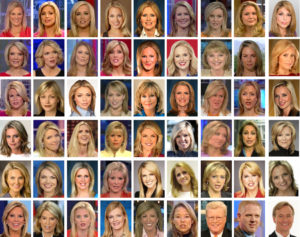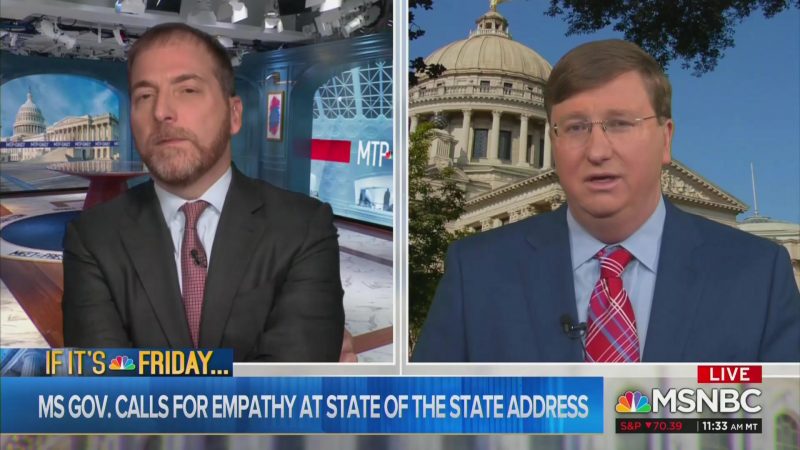Conservative Media Trolls Out Another Angry Blonde Woman To Deliver Expert Analysis On Race

While I had no idea who Tomi Lahren was prior to the Final Thoughts with Tomi segment by Glenn Beck’s Blaze TV, which focused on actor Jesse Williams’s recent BET Awards speech, I instantly knew that she was going to be some sort of newly-anointed conservative firebrand of some note when I saw her.
I hate to judge a book by its cover, but this has become a conservative news trope: the Angry Blonde Woman.
Joining the likes of Elisabeth Hasselbeck, Ann Coulter, Megyn Kelly, Ainsley Earhardt and a literal gaggle of other blondes that you don’t even have to finish your Google query for before it gives you exactly what you’re looking for: Hitler’s wet dream.

Fox News alone has pioneered the usage of news personalities who have pretty faces, blonde hair and are as white as Santa Claus.
Ann Coulter, who plays the part of slimy, lizard creature who evades bright lights and thrusts herself towards the nearest water source in order to multiply the numbers of her kind, really gave rise to this media phenomenon emergent over the last decade or so. Thanks, Ann.
It seems that many times, these women are typecast to report the news as indignantly as possible, which brings us to Tomi Lahren’s attempt to deconstruct Jesse Williams’s acceptance speech. And things didn’t go well.
In a segment that seemed to be uncomfortably forced, Lahren succeeds only in placing herself among the lowest common denominators of Angry Blonde Females on the news embarrassing themselves over matters of race in America.
Beginning her segment, Lahren’s eyebrows immediately curl upward to give us quite a convincing example of Darwin’s Grief Muscle in action.
“Well the BET Awards were last night,” Tomi fires off, sounding irritated. “Notably, they were very Black.”
That’s just throwing all the cards on the table immediately. With such a coached introduction, the audience knows where this is going. And if there were any doubt as to what one could expect up until this point, the opening line, which is designed to prompt certain reactions, demonstrates clearly what you’re in for.
“Oh, but can I say that? What with my whiteness and all?”
Telling, because white people can’t say “black.” Except that they can, but this feeds into the exact sentiment of people who believe such pettiness is widespread, so it persists.
Let’s clarify. Saying the word “black” in reference to Black people doesn’t make you racist. Let’s run through a couple of examples:
“Several people, both Black and white, engaged in a community forum on racism.”
Not racist.
“Blacks commit more crime because they’re innately criminal.”
Racist.
The point is, identifying a person or thing, neutrally, as Black isn’t racism. It’s a matter of context. And if you’re wondering why I capitalize Black, it’s because whites typically relate their nationality back to their European heritage. Many Blacks don’t have that luxury.
In any case, media plays the game of selling ideas and setting expectations, so we identify immediately the attempt to invoke the “assumed” (but not really) notion that Blacks take offense to any and all reference to race. Another common trope among conservative types.
Driving it home comes the, “Well, too damn bad!”
Too damn bad… that there’s no real point being contested or proven here.
What happens next is special. Blacks are always expected to apologize for the violence in the Black community without the privilege of ever being recognized as an individual who actually may not think like a violent person. We also observe this with requests for “moderate” Muslims to assure us that they are also human, while expecting them to denounce violent acts committed by random people thousands of miles away.
But in this case, we’re going to divvy it up between rich, Black actors and all other Black people I guess.
If it serves the narrative, Blacks will be viewed as a bloc. Likewise, if it serves the narrative, Blacks will be divided accordingly so as to isolate the point of intended mass effect.
Then come the usual accusations of “victimhood” and “police-bashing”. Because, you know, when 14 percent of the nation’s population represents nearly 40 percent of the prison population, most serving time for non-violent drug crimes and sentenced by a criminal justice system which has its legitimacy consistently challenged by anyone who’s paying attention, there’s no real concern of race-based policing even as the Supreme Court rules that evidence obtained in an illegal stop can now be used in court, reinforcing the already controversial Terry Stop (also known as Stop and Frisk).
She then segues into police shootings of unarmed Black civilians with some messy language about how “unarmed Black man” is “literally accurate”, but “doesn’t tell the whole story” as she then proceeds to cite police shootings of armed Blacks which are a completely different variable. Failing to note the distinction, she blends a sloppy representation of tragic events together with the bratty satisfaction derived from making a point so effortlessly, and so concisely because it is made so factlessly, that it actually works against one to appropriate the required time to correct it.
Ironically, it’s her own account of most police shooting victims being armed that proves the point against her own argument. While it’s literally accurate that police shootings mostly involve armed suspects, the rate of unarmed Black victims outpaces that of whites.
The Civil War reference is a piece of beautifully constructed propaganda. Evading truth at every turn, we get a review of Civil War history that a first-grader wouldn’t even get full credit for (full disclosure: I’m a social studies teacher by trade).
There is absolutely no mainstream view of the Civil War which suggests that it was fought explicitly to end slavery. It simply isn’t true. It was fought to preserve the Union. Turns out, secession was illegal and economically compromising. Sure, the economic factors were directly tied to slavery, but for any white savior revisionism to stick, the North probably should have acted before industrialization began rivaling, and thus replacing, the primacy of the Southern economy.
Further, the talk of “mostly white” (because they were, um, free) soldiers fighting to end slavery spills forth from among the most perverted interpretations White Man’s Burden. I actually blacked-out for a second during this and had to watch it a second time.
And, like clockwork, the Democratic Party thing about slavery and Jim Crow which completely ignores the change of Republican goals towards the dawn of the 20th century, New Deal effect, Nixon’s Southern Strategy and the fact that those old, Dixie Democrats have long since migrated into the Republican Party gets repeated because Republicans are obliged to a quota of at least one anachronistic reference to the Democrats and slavery.
Before capping off the performance with a rambling crescendo which includes Jesse Williams himself, along with Beyoncé, Jada Pinkett-Smith and, of course, Al Sharpton, as the dividing force in America, we are treated with a rousing misunderstanding of privilege.
Somehow, the 23-year-old, white girl with the pretty face who got a job as a host with the conservative One America News Network straight out of college when she only applied for an internship, proceeds to dispel the myth of privilege in American society.
As the coverage and opinions offered are so consistently weak, the worst kept secret in media is that the Angry Blonde Woman isn’t actually employed to add to the dialogue. used for their looks to bait viewers who subscribe to a more rigidly patriarchal conservative view point, like the people to whom this sort of thing is aimed:

The jig is up. It has been. It’s a strategy to bait not only viewers, but critics as well. Never mind that the role that many of these women play offers little of value to the discussions of our day, if you criticize them, you fall into the obvious conservative trap of not supporting successful women, laid beyond the context of what measures success to begin with waiting to be triggered by the least clever of mechanisms designed to expose a double standard. Again, we see what you’re doing there.
It drags the discussion down. It drags media down. And it drags women down.






